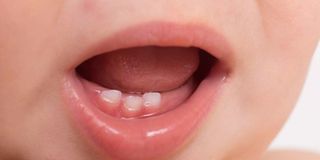Why you should not be worried when your baby is born with milk teeth

What you need to know:
- A number of nursing mothers and communities believe that the prenatal teeth are a sign of bad omen; a generational curse.
- The prenatal teeth often grow when the baby is between zero to six months.
When Ms Zainab Makoha delivered her first born daughter early this year, she was looking forward to bringing up a healthy baby.
The first two weeks of motherhood had been fun, with the baby sleeping most of the time, giving the first time mother enough time to relax.
Trouble, however, began when the baby turned three weeks old. She would cry a lot and hardly slept at night. Her temperatures were also high while she could not eat anything. At first, Ms Makoha thought that the baby was having stomach upset and decided to buy syrups. However, the cries did not stop. “I had made up my mind to visit a health centre with the baby, but a neighbour advised that she may have grown plastic teeth.”
The neighbour examined the baby by inserting her finger inside her mouth, confirming that she had developed teeth at the sides of her jaws.
At first Ms Makoha was scared — this was the first time she was learning of a three-weeks-old baby growing teeth, which was rather abnormal. “The situation was worsened by the fact that my community believes that a baby who is born with teeth or develops them earlier is a bad omen or generational curse.”
“The neighbour advised that the teeth had to be removed or I would lose the baby. At this point, I got so confused. How was such a young baby going to survive the pain of teeth removal.”
Another matter of concern was that the teeth were to be removed by a traditional herbalist “because going to the hospital would slow the healing process”.
Eventually, Ms Makoha gave in.
The process was so painful. The screams got louder as the 70-year-old traditional medicine man removed three teeth from the jaws of the baby using forceps. To stop the bleeding, he applied some medicine on the injured jaws before handing over the baby to her mother. The bleeding, however, did not stop, and she succumbed to severe bleeding.
Dr Vitalis Ogolla, a dentist at Royal Dental Clinic, Kisumu says quite a number of babies are born with milk teeth, an issue that should not be a cause for alarm. During birth, the teeth appear like eruption cysts that may shrink and disappear as the baby grows.
“In some cases, they end up developing into milk teeth,” says Dr Ogolla, noting that the teeth are referred to as natal when they grow within one month of birth and natal when they grow after one month.
The prenatal teeth often grow when the baby is between zero to six months. “Normally, there is no cause for alarm, these are normal gum teeth that choose to come early,” he says.
A number of nursing mothers and communities believe that the prenatal teeth are a sign of bad omen, a generational curse, while some also associate it with death.
Just like Ms Makokha, some women also think that the early growth of teeth results in poor feeding, loss of weight and mouth infection. “When a baby grows teeth, it often appears as a foreign body and they tend to touch the area, thus introducing bacteria to the mouth in the process, “continues Dr Ogolla.
Dr Immaculate Opondo, a paedodentist at Jaramogi Oginga Odinga Teaching and Referral Hospital, further clarifies that 99 per cent of children brought to the hospital for growing ‘plastic’ teeth have no problem at all, and instead maybe ailing from a different infection.
“A number of new mothers believe that plastic teeth are maggots that when not removed result in fever, weight loss, poor eating habits, persistent pain and even death,” she says.
Most caregivers often prefer taking their children to traditional birth attendants, who remove the teeth using crude and unsterilised instruments without anesthesia, which may result in severe bleeding.
Dr Ogolla, however, cautions that the traditional practices may only introduce bacteria and infections such as septicemia, a serious blood stream infection.
“The baby may also suffer from severe bleeding, leading to death if not properly treated, “adds Dr Opondo.
The removal of the prenatal teeth, also referred to as infantoral mutilation, may also result in poor growth of the jaws, crowding of teeth in the mouth and poor growth of the milk teeth, thus affecting the baby’s feeding.
“We do not know how many children are dying due to this exercise, we can only tell those who die after they are brought to the hospital. More children are dying without our knowledge, “she says.
Health experts do not recommend the removal of the teeth unless they cause discomfort to either the baby or mother during breastfeeding, bruise the infant’s tongue, leading to ulcers or the rigor disease.
The milk teeth, which are always loose, may also accidentally fall and be swallowed by the infant, which may be dangerous.
In such cases, a dentist should be called to examine the teeth.
The health expert can then choose to smoothen the edges of the teeth to prevent them from causing further harm or remove them using sterilised instruments with proper medication.
"The babies must also stick to breast feeding and only be introduced to solid foods at the required time despite having grown the milk teeth earlier,"concludes Dr Ogolla.



